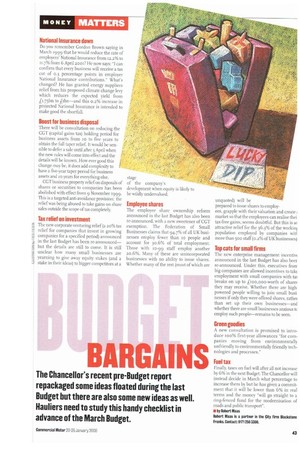National Insurance down
Page 45

If you've noticed an error in this article please click here to report it so we can fix it.
Do you remember Gordon Brown saying in March 1999 that he would reduce the rate of employers National Insurance from 12.2% to ii.7% from 6 April 200r? He now says: "I can confirm that every business will receive a tax cut of 0.3 percentage points in employer National Insurance contributions." What's changed? He has granted energy suppliers relief from his proposed climate change levy which reduces the expected yield from L.1.75bn to Libn—and this 0.2% increase in projected National Insurance is intended to make good the shortfall.
Boost for business disposal
There will be consultation on reducing the CGT (capital gains tax) holding period for business assets from io to five years to obtain the full taper relief. It would be sensible to defer a sale until after 5 April when the new rules will come into effect and the details will be known. How ever good this change may be, it does add complexity to have a five-year taper period for business assets and to years for everything else.
CGT business property relief on disposals of shares or securities to companies has been abolished with effect from 9 November 1999. This is a targeted anti-avoidance provision: the relief was being abused to take gains on share sales outside the scope of tax completely.
Tax relief on investment
The new corporate venturing relief (a 2o% tax relief for companies that invest in growing companies for a specified period) announced in the last Budget has been re-announcedbut the details are still to come. It is still unclear how many small businesses are yearning to give away equity stakes (and a stake in their ideas) to bigger competitors at a
stage of the company's development when equity is likely to be wildly undervalued.
Employee shares
The employee share ownership reform announced in the last Budget has also been re-announced, with a new sweetener of CGT exemption. The Federation of Small Businesses claims that 94.7% of all UK businesses employ fewer than io people and account for 3o.6% of total employment. Those with 10-99 staff employ another 20.6%. Many of these are unincorporated businesses with no ability to issue shares. Whether many of the rest (most of which are
unquotec) will be ''"•• •
prepared to issue shares to employ
ees, grapple with their valuation and create ; market so that the employees can realise thei tax-free gains, seems doubtful. But this is an attractive relief for the 36.3% of the workinl population employed by companies wit) more than 5oo staff (0.2% of UK businesses)
Top cats for small firms
The new enterprise management incentivr announced in the last Budget has also beer re-announced. Under this, executives frorr big companies are allowed incentives to takc employment with small companies with ta.) breaks on up to Lroo,000-worth of share: they may receive. Whether there are high. powered people willing to join small busi. nesses if only they were offered shares, rathet than set up their own businesses—and whether there are small businesses anxious tc employ such people—remains to be seen.
Green goodies
A new consultation is promised to introduce T00% first-year allowances "for companies moving from environmentally unfriendly to environmentally friendly technologies and processes."
Fuel tax
Finally, taxes on fuel will after all not increase by 6% in the next Budget. The Chancellor will instead decide in March what percentage to increase them by but he has given a commitment that it will be lower than 6% in real terms and the money "will go straight to a ring-fenced fund for the modernisation of roads and public transport".
• by Robert Maas
Robert Maas is a partner in the City firm Blackstone Franks. Contact: 0171250 3300.




































































































